Gekkan Shoujo Nozaki-Kun (Monthly Girls Nozaki-Kun in English or GSNK for short) thrives on comedic misunderstanding. And while it is now classified as a shoujo anime (an anime aimed at girls aged 7-18), it’s not your typical high school rom-com. It’s set in a high school, and the female protagonist Sakura is a cutesy smol with big red bows with polka dots. The male protagonist Nozaki is a towering, silent hulk, easily mistaken for brooding, but there the similarities with your standard anime rom-com end.
You see, Nozaki is a celebrated manga artist, and not just any kind of manga. The man writes a successful shoujo called “Let’s Fall in Love,” but no one knows he is the artist behind the sappy, gushy romance. You’d never suspect it yourself if the story didn’t tell you, and that’s one of the best things about this anime: the way it plays on and reverses the audience’s expectations and then turns it all into a joke.
GSNK is a laugh-out-loud, snort-your-milk funny anime that subverts stereotypical gender roles while also aiming a sharp critique at the way that animes often reinforce gender roles in a harmful way. And, it’s one of my all-time faves. I’m pretty convinced that even non-anime watchers would love it, so in this series I’m going to give you all the reasons why, if you haven’t, you should watch this anime.
Hands down the best reason to watch GSNK is that it’s goddamn hilarious. I’ll admit, I’m a sucker for comedic melodrama (Tamaki from Ouran High School Host Club makes me laugh so hard I cry), a staple of anime rom-coms. But again, GSNK is not your typical high school rom-com. It has these moments of course: Sakura’s inner thoughts are a study in over-the-top melodrama.
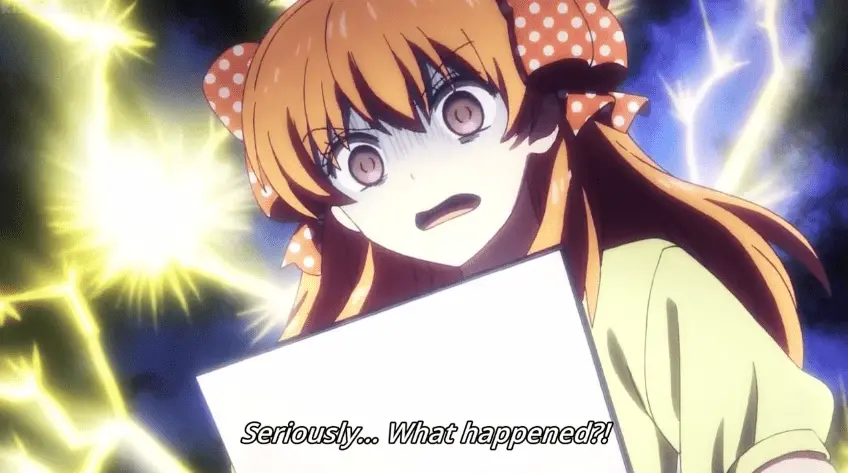
But despite the melodrama, GSNK’s emphasis on comedic misunderstanding makes it rather Shakespearean in its approach to comedy.
Anime and Shakespeare? I’ll explain. Look at all of Shakespeare’s comedies and you’ll find a common theme of disguise, mistaken identity, and misunderstanding. He is a master of the comedy of the absurd: a fairy accidentally giving the wrong characters a love potion to the chagrin of all involved (A Midsummer Night’s Dream), a male falling in love with a female dressed/acting like a male (Twelfth Night). In As You Like It, Rosalind, dressed and living as the male page Ganymede, not only tries to ‘cure’ Orlando of his love for her (as Rosalind) as a means of seeing how much he really does love her, but a shepherdess named Phoebe falls in love with Ganymede (really Rosalind) and there’s a huge fight about who gets to marry whom.
The entirety of A Comedy of Errors is a series of farcical mishaps based on the mistaken identities of two sets of identical twins who had been separated at birth. Shakespeare loved his comedic misunderstandings and his audiences loved him for it. Yet, Shakespeare was also a master of including all forms of comedy in his plays: slapstick, earthy (read: dirty) jokes, situational awkwardness, and the downright absurd. GSNK has pretty much all of these as well, meaning there’s something in there for everyone.
Mistaken Identity & Misunderstanding
The precipitating incident for the series is Sakura attempting to make a declaration of love to Nozaki that he mistakes as a fangirl asking for his autograph. Girls and boys everywhere can identify with awkward attempts at asking someone out that fall flat. The first five minutes of the show is each of them talking past the other.
Granted, we don’t see Nozaki’s internal monologue, but Sakura’s delightful self-flagellation and misunderstanding of his reactions is enough to make the audience giggle. That Sakura’s ardent, romantic side and Nozaki’s obliviousness lead to a delightfully awkward friendship throughout the series means that not only do we get to see more of these moments (and more catharsis), but also that the audience gets a chance to see that a failed romantic overture need not destroy a potential friendship (this is SO important, so I’ll talk about it more in part 2).
The pinnacle of misunderstanding and misidentification lies between Seo and Wakamatsu. Seo is the physically aggressive, emotionally oblivious, loud, tomboyish best friend of girly and romantic Sakura. She’s obtuse and a bit of a tease (not in the sexy way, in the doofus middle school boy way). One of the favorite objects of her teasing is an emotionally sensitive, anxious boy named Wakamatsu. He doesn’t know how to handle her stealing the ball from him, or her playful shoves, or her teasing him by calling him Waka. It drives him crazy, and he has trouble sleeping. The only cure for his insomnia is the beautiful voice of a girl called “the Lorelei of Glee Club.” Guess whose voice it is. Seo.
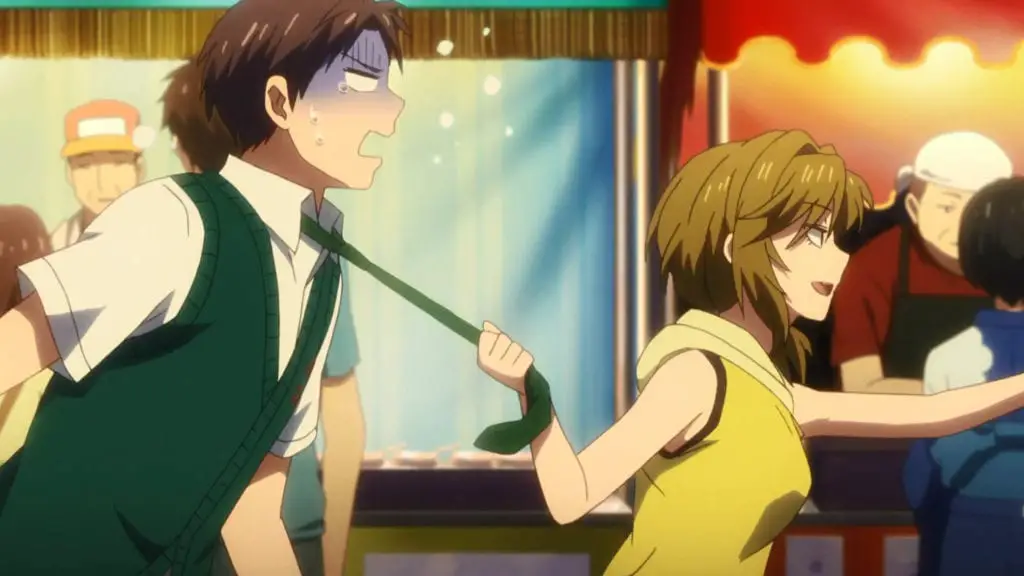
But Wakamatsu doesn’t know that the source of both his greatest angst and his greatest joy is one and the same person. He will wax lyrical about “Lorelei” in the same breath as he frets about how obnoxious Seo is. At one point (episode 6), Waka even tells Seo to her face that Lorelei wouldn’t treat him the way she does. And then come the DVD specials (6 short episodes roughly 5 mins long bundled with the DVD). In the first three episodes, Wakamatsu tries to figure out who Seo’s ‘boyfriend’ is when he sees Seo hanging out with Kashima, whom he’s never met. Nozaki assumes that Wakamatsu is romantically interested in Seo, but Wakamatsu just can’t seem to admit it.
In short, their entire relationship is built on misunderstanding. They constantly talk past each other and the resulting miscommunication is funny without being tiresome or too similar to the way that Nozaki misunderstands Sakura’s romantic interest.
Slapstick
If slapstick is more your thing, there’s Kashima and Hori. Kashima is the school’s prince character—the one all the girls fawn over for being charming, witty, and genuinely thoughtful and complimentary. Kashima is also a female (I’ll talk more about how she subverts gender roles later). Her popularity with the other girls at school makes her habitually late for theater club, much to the chagrin and annoyance of the club president, Hori. She admires him and wants to make him happy, but she can’t overcome her inclination to be charming. She’s always making mistakes because she’s not paying attention. Or the girls around her make mistakes so she will pay attention to them. Hori reacts with Full Metal Alchemist style slapstick: he drags her by her ears, hits her with signs or posters, kicks her in the ass, yells etc.
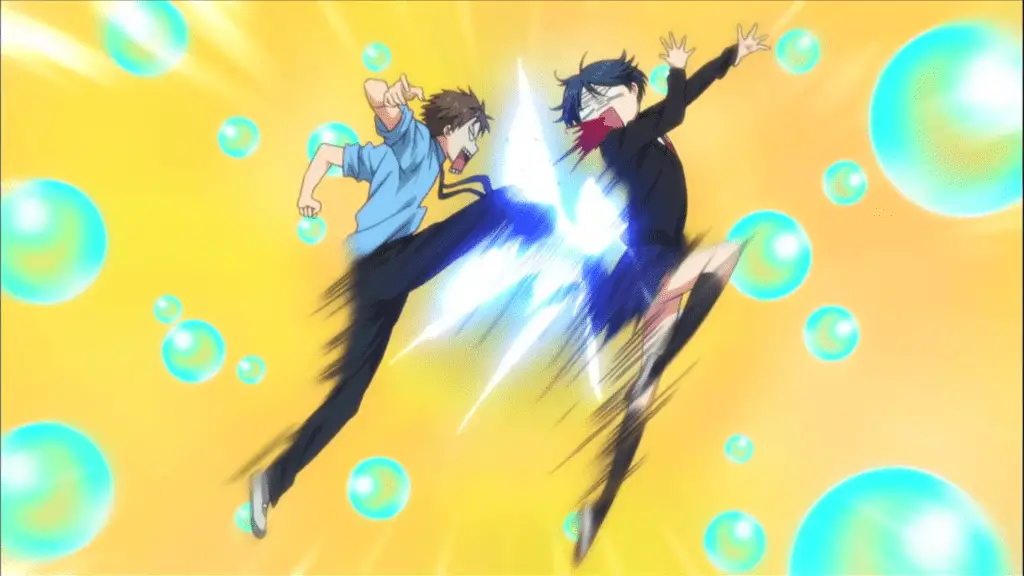
Even the slapstick has a layer of misunderstanding. Rather than seeing them as angry gestures from an annoyed director, Kashima interprets his violence as gestures of affection. She sees herself as Hori’s “beloved kohai” (junior, or protégé) or “number one.” It’s what makes her special and different from all the other girls (and boys) in drama club.
Earthy Humor & Innuendo
What’s an anime rom-com without some innuendo? Nozaki says that he, Mikoshiba, and Sakura “spend time in an apartment doing this and that” (episode 3). In a moment of anxiety, Sakura blurts out to Kashima that Nozaki is repaying Hori with his body (episode 3). Almost all of Mikoshiba’s lines said directly to girls are sexual innuendos. He comes across at first as your stereotypical arrogant asshole, but he makes up for his dirty mind by being super embarrassed by what he says, which is adorable.
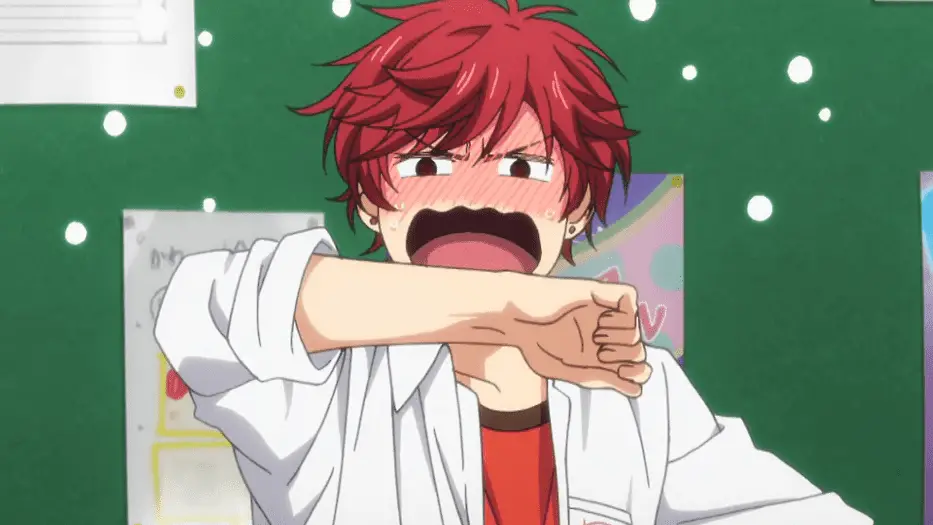
Kashima’s obliviousness and devotion to Hori often result in earthy humor. In episode 3, Sakura recognizes one of the symbols used in Nozaki’s manga to indicate shading—a pair of briefs—and asks Hori about it to see if he is the one helping Nozaki with backgrounds. Kashima, who overhears, thinks they are discussing which underwear they prefer to wear. She then thinks that the way to bond with Hori is to tell dirty jokes. You can imagine how well that goes.
In a later episode (8), she mistakes Hori’s interest in shoujo manga for a desire to act and dress as a girl. She leave him skirts in his locker, nominates him to play the princess in the high school play, and, dressed like a prince, offers to carry him across the school when he passes out from exhaustion (I love that the borderline bullying that results doesn’t ruin their relationship, but I’ll get into that in part 3).
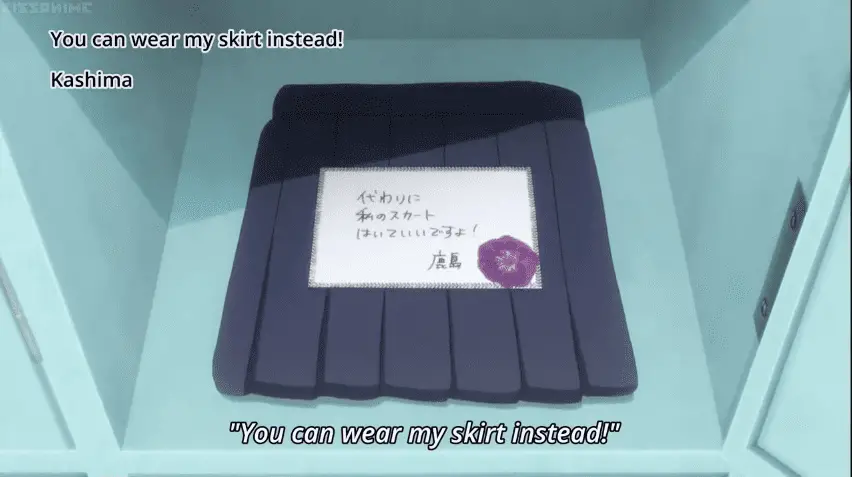
Episode 8 has plenty of innuendo and the same kind of feel as Kashima’s interactions with Hori, but this time with Nozaki. They’re in the mall looking for art supplies and Nozaki feels inspired to look at various costumes and bishoujo figures (pretty, typically busty and scantily clad female figurines) as inspiration for his manga. While Nozaki’s actions look perverted, he intends them innocently, just like how Kashima genuinely intends friendly overtures to Hori, but they come out kind of kinky and weird. In the DVD specials, Wakamatsu thinks Kashima is a boy, and so sticks creepily close to her while Seo and Sakura fawn over cute swimsuits at a store in the mall. He’s trying to avoid being pervy, but actually comes across pervy instead.
Thus even for its dirty jokes GSNK thrives on the comedic gap between expectation and reality and between intention and misunderstanding.
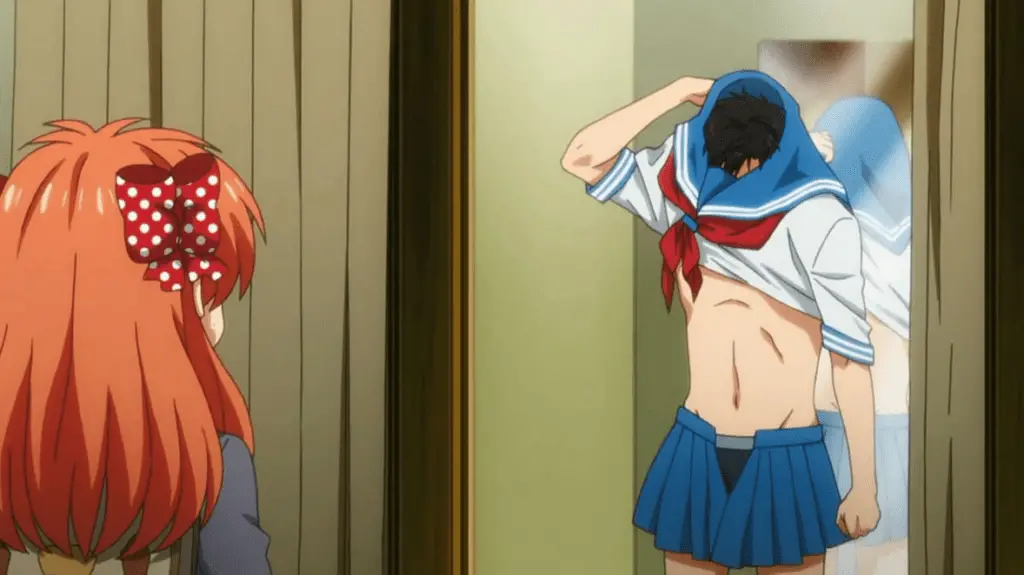
Situational Awkwardness
As an anime about the author of a manga, GSNK can get pretty meta about the difference between what happens in mangas and what happens in real life. Pretty much any time Nozaki tries to enact manga situations or apply manga logic to real life awkwardness ensues. In the very first episode, he is trying to figure out a way for his characters to get home when only one of them has a bicycle. Sakura agrees to help. She wants to get close to him; he wants to experiment for his manga. He and Sakura try several different scenarios that end up with Sakura either embarrassed, bored, or feeling guilty.
A similar situation happens when Nozaki practices the shoujo trope of giving a meal to one’s romantic interest (episode 11), and when he tries to apply manga logic when helping Mikoshiba prepare for a mixer/party he had been invited to (episode 4). Both times, Nozaki’s earnest investment in the situation and attempts to apply manga tropes to real life make for very awkward interactions with his friends. When he tries to apply manga logic to help him win a dating sim (episode 4), he fails. Every single time. Similarly, when Nozaki gets sick and Wakamatsu, Sakura, and Hori attempt to write his manga for him by patterning the story’s characters after their friends, the resulting failure is deliciously ridiculous (episode 6). Again, just go watch it. You’ll thank me.
Each of these situations stems from misunderstanding the gap between real life and anime. The juxtaposition of romantic ideal and awkward reality hints at one of the shows major themes: the distance between real life and what is depicted in the media. I’ll get into this more in part 4, but for now, I’ll say that GSNK hits hard at how poorly media represents reality and how problematic this gap has become. Nozaki is oblivious to the implications of his own work, especially how it represents his friends and his own life experience (see especially, the GSNK DVD specials, episode 4). He can’t see that reality doesn’t work like a manga and his continued efforts to try and force them to coincide are both funny and enlightening.
The Downright Absurd
One word: tanukis.
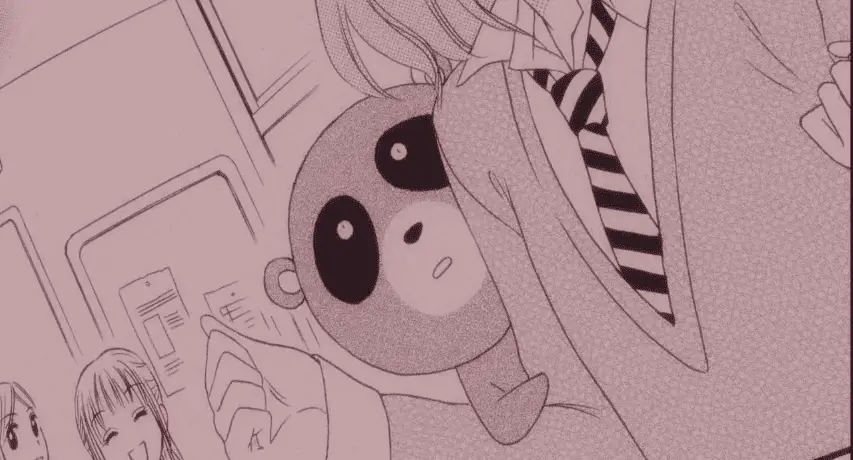
The humor in episodes 5-7 revolves around concerns specific to publishing manga and are slightly less accessible to a broad audience. However, if you have any experience with writing, publishing, or art production and dealing with editors, you get it. Distant editors who take months to get back to you. Self-promoting editors who take credit for all your ideas or who try to insert their ideas into your work. Editors who spoil your story in the promotional material. Editors that you look up to and want to like you, but don’t seem to care about you at all. You get it. Oh, do you get it.
Back to tanukis. Nozaki and his upstairs neighbor Yukari once shared the same editor named Maeno. Maeno is OBSESSED with tanukis. He wants at least one in every manga he produces, usually in every panel.
Nozaki’s current editor, Ken is a taciturn, aloof young man who also dislikes Maeno. Nozaki labels him as the “cool, mature type” and is desperate for his good opinion. Rather comically so for the usually stoic Nozaki. You could cut the comedic misunderstanding with a knife.
The entire editing arc is both absurd and painfully true to life, but to me, the crown of absurd glory goes to episode 4, when Nozaki and Mikoshiba spend a night playing (read: overanalyzing) a dating sim. The entire situation is glorious, but the BEST part of this scenario comes when Nozaki and Mikoshiba stay up all night to write a manga to honor Tomoda, the helpful friend of the games’ protagonist. In their minds, the character spent all of his years at high school selflessly helping the protagonist out of unrequited love. This is the most delightfully absurd moment in the whole series, hands down. High school boys weeping on the floor for a dating sim.
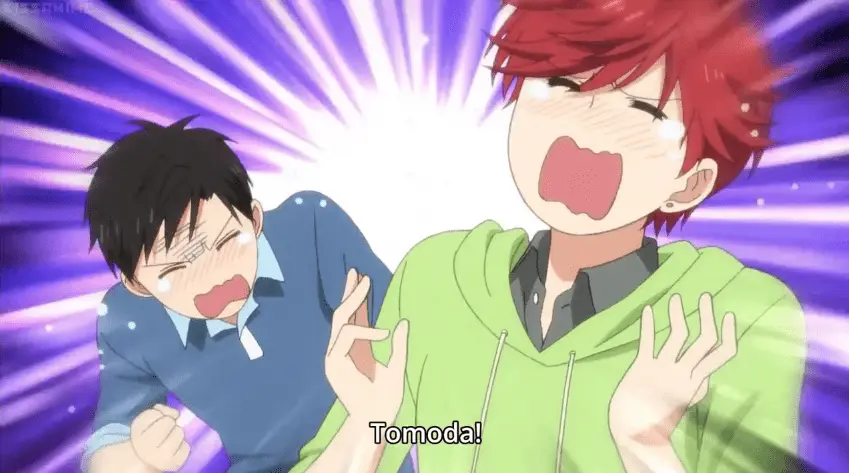
This scene is less about comedic misunderstanding and more about thwarting expectations. The audience expects Nozaki and Mikoshiba to play the sim and talk about girls, they are, after all, having a sleep over. Instead, they play the game and end up eulogizing Tomoda’s unrequited love for the sim’s protagonist. Yet this too has an element of misunderstanding. Nozaki’s failure to understand just what kind of game he’s playing leads him to overanalyze character interactions and read meaning where none is intended by the game’s creator. (On a side note, this is a delightful commentary on ‘shipping.)
Conclusion
If it isn’t already clear enough, I adore Gekkan Shoujo Nozaki-kun. It’s not your typical high school rom-com. It’s really a com with a dash of rom, rather than rom with a side of com–like most high school animes. It consistently relies on subversion of expectations and misunderstanding for its humor (as well as its eccentric and stereotype challenging characterizations, which I will get into next time), and it never gets old. It doesn’t matter how often I’ve seen Wakamatsu rail against Seo and idolize “Lorelei.” I laugh every time.
All in all, GSNK pulls off the rare feat of having dense characters being dense without the results being utterly annoying. The characters are endearingly obtuse. They talk past each other all the time. They think they know what’s going on, but they don’t. They speak out of turn or stumble into innuendo without thinking. They generate comedic misunderstanding merely by existing and interacting with each other in the same space. It’s funny, adorable, and realistic without getting overdone or tired.
Is it high class humor? Yes and no. There’s not much in the way of witty one liners or subtle conversational humor here; GSNK is no Arrested Development. And you know what? I’m totally okay with that. I love dry wit, and there’s a place for it. I also love over-the-top ridiculous, funny conversations and one-liners, and comedic misunderstanding. And if you like those things, GSNK is well worth watching.
At its best, comedy ought to be cathartic and deeply human. It should be universal. Laughing at others allows us to laugh at ourselves, which frees us from shame. In my mind, GSNK accomplishes this better than almost any other anime I’ve ever watched. Seriously, just go watch it.
Stay tuned for Part 2, in which I discuss the ways that GSNK subverts gender roles!

